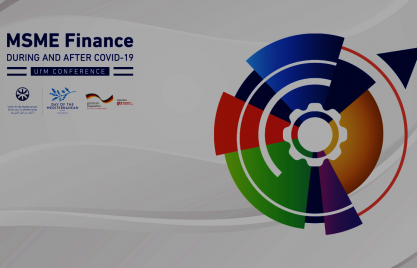The COVID-19 pandemic has caused massive health and economic consequences globally, with developing countries particularly exposed. Everywhere, the greatest toll is falling on those already most vulnerable, causing terrible damage to human development across the world.
Yet the pandemic has also opened the door to new opportunities. For instance, lockdowns and social distancing have rapidly accelerated digitalization worldwide, particularly in finance. Digital finance – most visible in payments – has become critical in addressing the crisis and supporting sustainable development more broadly. In this sense, the crisis offers an opportunity to build better systems to support financial inclusion and the UN Sustainable Development Goals, accelerating the development of digital payment and other systems and services to provide access to safe, affordable financial services to the 1.7 billion people who remain unbanked.
The need for digital financial services is clear. But ensuring their safe and inclusive development remains a major challenge. This raises several questions: How can we build better financial systems in the context of COVID-19 and going forward? And how can we use the pandemic to support the development of digital finance and fintech innovation?
From our standpoint, a successful strategy needs to span infrastructure, regulation and the wider ecosystem. Below, we will explore how such a strategy could be developed.
Building the Digital Financial Infrastructure
While the rapid digitalization being driven by COVID-19 has the potential to deliver inclusive growth, this will only be realized with appropriate infrastructure. For financially excluded people who do not have bank accounts, government-issued identification or other documentation, increased digitalization (through digital government-to-person payments, mobile internet access and cashless store policies) represents an additional barrier – and also risks widening the digital divide. Therefore, the infrastructure we develop must be directed at enabling inclusion.
The core of this infrastructure – as we identified in a strategy framework developed with the Alliance for Financial Inclusion – comprises the three key elements of sovereign digital identity systems, simplified account opening, and interoperable electronic payment systems, including prospective sovereign digital currencies. These three elements – underpinned by the widespread availability of mobile communications and internet connectivity – together provide the rails for a huge range of e-government activities. In particular, they enable financial transfers and payments, which are invaluable in addressing COVID-19 and supporting strategies to attain the SDGs.
Our research highlights the transformative benefits of this combination of digital financial infrastructure elements. Such a framework underpins digital financial transformation and reduces the costs of customer acquisition and new business model development, thus facilitating resilient and commercially viable businesses directed to a large range of previously excluded segments of society. Country experience from before and during the current pandemic underlines the value both in addressing crises and in underpinning the future development of a combination of digital communications, sovereign digital identity, wide access to financial accounts, and electronic payments for the delivery of financial resources and other services.
Designing Appropriate Regulatory Frameworks
Fintech is rapidly reshaping the financial sector. It has tremendous potential to bolster financial inclusion by reducing costs, customizing services down to the individual level, and widening the range and outreach of providers. Yet it is not without challenges and risks. An enabling fintech ecosystem needs to support innovation while promoting financial stability, market integrity and consumer protection.
Combining global good practice principles around regulations can help create pathways for the growth of innovative fintech firms. These principles can lead to regulatory approaches that are activity-based, proportional, technology-neutral and implemented in a constructive sequence.
We address these issues in a recent report – Fintech Toolkit: Smart Regulatory and Market Approaches to Financial Technology Innovation. In it, we analyze the range of tools available to promote fintech innovation for inclusion, in alignment with regulatory capacities and the sophistication of fintech markets. Our suggested pathway is as follows:
First, regulators can identify and modernize unsuitable regulations based on a regulatory impact assessment that determines whether legacy rules remain useful.
Second, regulators can implement proportional regulation in a tiered approach. That means provisions for market stability and integrity should be proportional to the extent of the risks of the regulated activity, with more lenient provisions for less risky activities and increasingly tougher requirements for riskier services. This will create supportive pathways for new, inclusive non-bank financial services.
Third, it is essential for authorities to upgrade supervisory data systems and implement regulatory technologies (regtech/suptech) in order to enhance the achievement of regulatory and supervisory objectives, particularly alongside the development of core digital infrastructure.
Fourth, regulators should create testing and piloting regimes that allow for leniency towards innovative firms through “wait-and-see” or “test-and-learn” approaches. Authorities can support innovations by licensed institutions and startups by extending, on a case-by-case basis, waivers or no-action-letters which validate certain activities or suspend certain rules.
Finally, restricted and specialized licenses (e.g.: for new payments providers, fintechs and other new entrants, as well as tech infrastructure providers) can allow approved innovative firms to further develop their client base and financial and operational resources in a controlled manner.
The targeted implementation of these tools will encourage the development of innovative financial products and services which greatly benefit financial inclusion and sustainable development going forward, while addressing attendant risks.
Supporting the Wider Ecosystem
While infrastructure and regulation are fundamental, focusing on the wider ecosystem in which they operate is central to maximizing inclusion and sustainable development.
From the standpoint of digital finance, the wider ecosystem focuses on education and talent, funding, and cooperation between policymakers, the private sector and civil society. This wider focus can include regulatory facilitation arrangements such as innovation hubs and sandboxes (which we will explore below), and specialized licencing frameworks (such as for digital challenger banks, digital banks, robo-advisers, virtual insurance companies, etc.).
A regulatory sandbox, which standardizes the scope of testing and piloting, will allow regulators to create a tightly defined safe space which exempts qualifying firms from specific regulatory requirements. Sandboxes can target particular policy objectives, like financial inclusion, as in the cases of Sierra Leone, Malaysia, Jordan and Bahrain. In developing countries, this explicit focus on financial inclusion and sustainable development ought to incentivize financial innovations that are beneficial in serving otherwise financially excluded customers and addressing wider developmental needs. However, global experience suggests that many fintech entrants may not qualify for a sandbox – or will decline to enter it, as their growth trajectory will take them quickly beyond its limits on the number of customers served or amount of credit extended. For this reason, we recommend that regulators prioritise the establishment and adequate funding of innovation hubs.
Cross-Border Harmonization and Market Access
The measures discussed above can support fintech innovation and accelerate progress toward the SDGs. They can be further advanced by harmonizing approaches at the regional level to help reach scale.
We believe that policymakers and regulators in many developing countries will need to focus particularly on the benefits of regionally harmonized regulatory frameworks for fintech. Regional collaboration in policy and regulation is a powerful factor in attracting innovative financial service providers: The more consistent regulatory approaches are across a region, the more attractive each of the national markets will be to new entrants. In turn, a greater number of providers in a region will allow customers to choose from a wider range of services, and benefit from more competitive prices, while allowing providers to tap into the new market segment that the unbanked represent: the next billion. These new savers offer not only attractive business opportunities when scaffolded by appropriate infrastructure and policies, they also bring new sources of savings and investment to support wider sustainable development. However, achieving the harmonization and interoperability of digital financial infrastructure and regulatory approaches as part of an enabling ecosystem for fintech is not easy, given differences in domestic political, social, technological and economic considerations.
The extent to which new technologies boost financial inclusion and sustainable development is largely dependent on the infrastructure, regulatory environment and wider innovation ecosystem of the developing markets in which they operate. Policymakers can build an enabling fintech ecosystem by implementing sequenced reforms that are informed by global best practice and responsive to the local context, while contributing to regionally consistent frameworks. Their concerted efforts toward these goals will enable innovative financial service providers to serve the market well, and to build and scale fintech solutions that support financial inclusion, innovation and sustainable development.
This article was originally published on NextBillion.
By Ross P. Buckley, Professor at The University of New South Wales; Dirk A. Zetzsche, Professor at the University of Luxembourg; Douglas W. Arner, Professor at the University of Hong Kong; Atilla Yucel, Advisor for Financial Inclusion and Technology at GIZ.
Photo courtesy of RAMillu.



